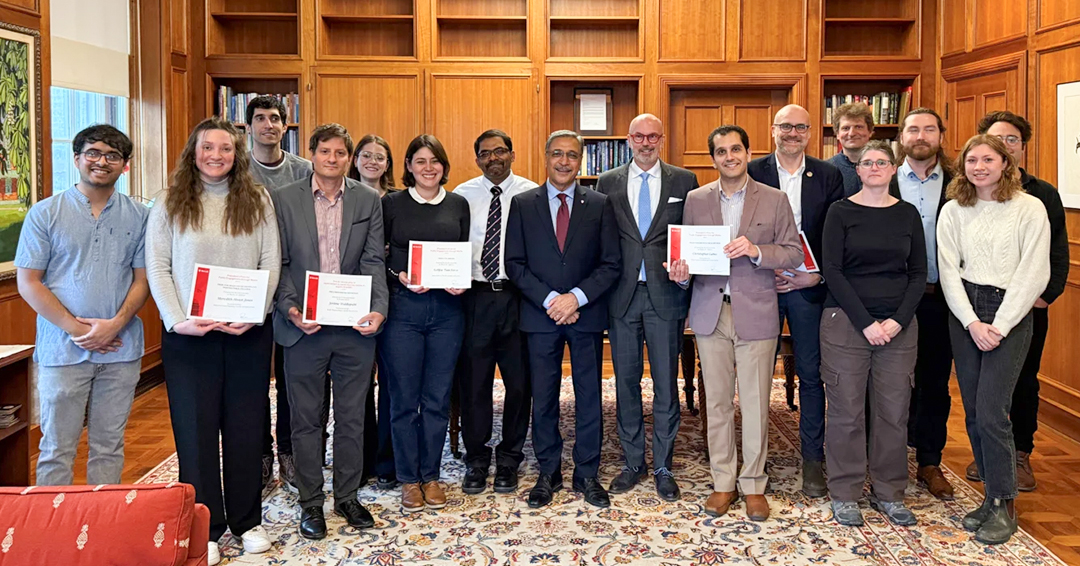
There were strong applications from across all 12 Faculties, testifying to McGillians’ commitment to sharing knowledge
This year’s winners of the President’s Prize for Public Engagement through Media include researchers who have shared their knowledge about biodiversity, health, public transit and solar eclipses.
In announcing the winners and runners-up, President and Vice-Chancellor Deep Saini noted that they were among a strong field of applicants spanning all 12 Faculties.
“This is further evidence that the sharing of knowledge and a love of learning are core McGill values,” he said.
Here are this year’s winners:
Established Academics: Jérôme Waldispühl and Attila Szantner
Professor Jérôme Waldispühl from the School of Computer Science has been working to involve citizen scientists in advancing biomedical research by playing video games for the past 15 years. His most recent project, launched in 2024, was created with his colleague Attila Szantner, and has resulted in the largest citizen-science project in the world. By playing a video game more than five million people around the world have significantly increased our knowledge of the relationships between microbes in the human gut. This information should lead to a greater understanding of how specific microbes are involved in a range of diseases.
The runners-up in this category this year were Professors Allison Christians, Mr. John Gradek, Professor Sarah Moser and Mr. Pascal Thériault.
Emerging Researcher: Dr. Christopher Labos
Christopher Labos is a cardiologist at the MUHC and Course Lecturer in the Department of Global and Public Health. Thanks to his concerted work with the media and the public, he has become an important voice, locally and nationally, fighting scientific disinformation and fostering a greater public understanding of medicine.
The runners-up in this category this year were Professor Sebastian Betermier, and Drs. Saskia Sivananthan, Hussein Wissanji and Ma’n H. Zawati.
Groups: The Eclipse Task Force
Fifteen graduate students, faculty members and staff from the department of Physics worked together for months to prepare for last April’s solar eclipse. They developed modules for elementary school classes, held a trivia night for the McGill community and shared information about eclipses on both social and traditional media. On the day itself, April 8, 2024, they welcomed a huge crowd to McGill’s lower field, creating an extraordinary gathering and giving out 18,000 pairs of eclipse glasses.
The runners-up in this category were McGill iGem, McGill Scientific Writing Initiative, McGill Summer Institute for School Psychology and The Neurovation Project.
Graduate Students and Postdoctoral Fellows: Meredith Alousi-Jones
Meredith Alousi-Jones is a doctoral student in the School of Urban Planning. In choosing her as the winner, the jury highlighted her numerous interactions with stakeholders, policymakers and the media to share her research about the transportation needs of seniors.
The runners-up in this category were Veronica Jaramillo, Tamara Thermitus, Iris Pintiuta and Vincent Paquin.
Changemaker Prize: Andrew Gonzalez
This award is given out at the discretion of the selection committee to recognize an individual whose dedication to sharing their knowledge has had a major impact on society. It is not an award one can apply for.
This year’s winner is Andrew Gonzalez of the Biology Department.
The committee wished to recognize Gonzalez’s many years of work on biodiversity monitoring, which has had a significant and positive impact in Quebec, across Canada and internationally.
In the lead-up to COP 16, held in Colombia last fall, Gonzalez was among a group of 60 international experts who established a biodiversity monitoring framework and then explained its implementation to participating countries. In Quebec, he co-led a year-long project to identify biodiversity indicators for the Quebec government’s new Nature 2030 Plan. He also helped define a clear vision and objectives for McGill’s own biodiversity plan, and then guided McGill staff, students and faculty in its implementation.
A small reception was held to celebrate the winners of this year’s prizes.
